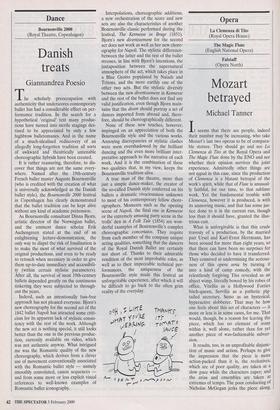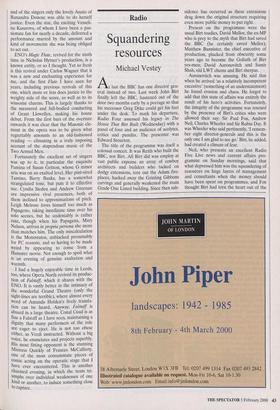Opera
La La Clemenza di Tito (Royal Opera House) The Magic Flute (English National Opera) Falstaff (Opera North)
Mozart betrayed
Michael Tanner
It seems that there are people, indeed their number may be increasing, who take Mozart's last two operas to be of compara- ble stature. They should go and see La Clemenza di Tito at the Royal Opera and The Magic Flute done by the ENO and see whether their opinion survives the joint experience. Admittedly other things are not equal in this case, since the production of Clemenza is a blatant betrayal of the work's spirit, while that of Flute is unusual- ly faithful, for our time, to that sublime work. Yet the fundamental trouble with Clemenza, however it is produced, is with its unmoving music, and that has some jus- tice done to it in the current run, though less than it should have, granted the illus- trious cast.
What is unforgivable is that this crude travesty of a production, by the married pair Ursel and Karl-Ernst Herrmann, has been around for more than eight years, so that there can have been no surprises for those who decided to have it transferred. They connived at undermining the serious- ness of this opera seria by turning it into a kind of camp comedy, with the relentlessly forgiving Tito revealed as an abject wimp, literally bowed by his robes of office, Vitellia as a Hollywood Forties bitch-queen, Servilia as a pathetic pig- tailed secretary, Sesto as an hysterical, hyperactive slobberer. That may be how one feels about this set of characters — it more or less is in some cases, for me. That would, though, be a reason for leaving the piece, which has no element of irony within it, well alone, rather than for yet another piece of was-fashionable subver- sion.
It results, too, in an unprofitable disjunc- tion of music and action. Perhaps to give the impression that the piece is more action-packed than it is, the recitatives, which are of poor quality, are taken at a slow pace while the characters caper; and the arias and ensembles are taken at extremes of tempo. The poor conducting of Nicholas McGegan jerks the piece along, and of the singers only the lovely Annio of Ruxandra Donose was able to do herself Justice. Even the star, the exciting Vesseli- na Kasarova, of whom I have been a pas- sionate fan for nearly a decade, delivered a performance marred by the amount and kind of movements she was being obliged to act out.
ENO's Magic Flute, revived for the ninth time in Nicholas Hytner's production, is a known entity, or so I thought. Yet so fresh is this revival under Carlos Wagner that it was a new and enchanting experience for me, and the first Flute I have seen for years, including previous revivals of this one, which more or less does justice to the weighty side of the score, as well as to its winsome charms. This is largely thanks to the measured and full-bodied conducting of Grant Llewellyn, making his house debut. From the first bars of the overture onwards it was clear that the Masonic ele- ment in the opera was to be given what regrettably amounts to an old-fashioned reading — climaxing in a truly imposing account of the stupendous music of the Two Armed Men.
Fortunately the excellent set of singers was up to it, in particular the exquisite Pamina of Susan Gritton, whose G minor aria was on an exalted level. Her pint-sized Tamino, Barry Banks, has a somewhat strangulated tone, but puts it to effective use. Cyndia Sieden and Andrew Greenan are impressive rival presences, both of them inclined to approximations of pitch. Leigh Melrose loves himself too much as Papageno, taking inordinate time over his solo scenes, but he undeniably is rather cute, though when his Papagena, Mary Nelson, arrives in proptia persona she more than matches him. The only miscalculation is the Monostatos, unblacked presumably for PC reasons, and so having to be made weird by appearing to come from a Hammer movie. Not enough to spoil what is an evening of genuine exaltation and warmth.
I had a hugely enjoyable time in Leeds, too, where Opera North revived its produc- tion of Falstaff, which it shares with the ENO. It is vastly better in the intimacy of the wonderful Grand Theatre (only the sight-lines are terrible), where almost every word of Amanda Holden's lively transla- tion can be heard. Anyway, Falstaff is absurd in a large theatre. Conal Coad is as fine a Falstaff as I have seen, maintaining a dignity that many performers of the role are eager to eject. He is not too obese either, as Verdi instructed. Without a big voice, he enunciates and projects superbly. His most fitting opponent is the stunning Mistress Quickly of Frances McCafferty, one of the most consummate pieces of comic acting on the operatic stage that I have ever encountered. This is another Charmed evening, in which the team tri- umphs over individual weaknesses of one kind or another, to induce something close to rapture.



























































 Previous page
Previous page